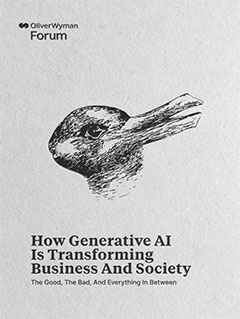How Generative AI Is Transforming Business And Society
The Good, The Bad, And Everything In Between

Explore Our Generative AI Report Chapters
Will generative artificial intelligence usher in a golden age of productivity or destroy millions of livelihoods across the global economy? Will it set people onto new paths of personal fulfillment or lead them into cul-de-sacs of loneliness and isolation? Will it lift humanity to new heights or sow the seeds of our collective destruction?
Depending on whom you ask, the answer to all those questions is yes.
In the 14 months since the launch of ChatGPT, it hasn’t become clear exactly how generative AI will transform the world, only that it will — with both positive and negative effects on individuals, families, socioeconomic groups, businesses, industries, and societies as it revolutionizes workplaces and reorders personal lives.
Many breakthrough technologies come with pitfalls. Fire allowed humans to gather at night but also burned villages. The automobile revolutionized mobility but brought traffic fatalities. The internet connected people instantly but gave new tools to criminals.
A key difference between generative AI and earlier innovations is that its very creators are warning of the potential downsides. The dual strands of promise and peril are woven throughout AI companies themselves; look no further than the battle for control of OpenAI for an example of the deep ambivalence that generative AI is producing.
But there is opportunity in the ambiguity. The starting gun of the generative AI race was fired a long time ago, but ChatGPT brought a rush of new companies and countries into the race. Business and government leaders will decide how much of the development will be open-sourced and transparent versus closed-sourced and proprietary. Regulators will decide the pace and breadth of the action. Consumers and workers will be central in the technology’s adoption and will help determine how quickly the benefits are captured.
With that in mind, the Oliver Wyman Forum set out to thoroughly examine the attitudes, perceptions, and misperceptions surrounding generative AI. In June and November, we surveyed more than 25,000 people across the United States, the United Kingdom, Canada, Mexico, Brazil, France, Italy, Germany, Spain, China (Hong Kong), India, Indonesia, Singapore, the United Arab Emirates, and Australia.
The findings highlight the confusion many people feel. While 96% of employees said they believe AI can help them in their current job, 60% are afraid it will eventually automate them out of work. Some 55% of employees use generative AI at least once a week at work, but 61% of users do not find it very trustworthy. Of those 61%, 40% would nevertheless use it to help them make big financial decisions, and 30% would share more personal data for a better experience.
Amid the cacophony of opinions and predictions, there is a growing consensus around the world that generative AI’s influence on both the workplace and the consumer economy will be massive.
The new AI-conomy
We estimate that generative AI could add up to $20 trillion to global GDP by 2030 and save 300 billion work hours a year.
The possibilities are extraordinary. Fully 96% of the workers we surveyed said they believe generative AI can help them in their jobs. But as generative AI reshapes the workplace, it could place new stresses on organizational structures. In all, the broad category of AI could displace 85 million jobs globally by 2025, according to an estimate by the World Economic Forum. One-third of all entry-level roles could be automated; at the same time, junior employees armed with generative AI may potentially replace their first-line managers, leaving a vacuum in the middle of the job pyramid.
As a result, many workers are growing more anxious by the day. Automation is no longer a narrative of blue-collar workers versus robots. Three in five white-collar workers now fear their roles will become redundant or automated as generative AI’s abilities increasingly impact knowledge jobs. Left to fester, this anxiousness could sap morale: According to the American Psychological Association, employees in the United States who are concerned about AI are 68% more likely to feel tense or stressed out during the workday than those who aren’t worried, and are more than twice as likely to believe they don’t matter to their work community.
Such feelings, in turn, could lead to decreasing engagement and productivity, and higher turnover.
To reap the benefits generative AI can bring, companies should embrace a people-first approach, investing in workers as much as, if not more than, the technology. Employees will need training and support to create sensible and intuitive processes alongside this technology. After all, they are the same ones who will use the interfaces, update the systems, and manage the outputs. Business leaders need to bring them along by listening and addressing their concerns, and up/reskilling their employees along the way.
Radical change for consumers
The generative AI picture becomes a bit clearer when we examine its impact on consumers and its widespread influence across various industries. Healthcare appears to be especially ripe for disruption. We estimate that by 2030, generative AI could save doctors three hours a day, which would allow them to serve an additional 500 million patients globally per year (assuming the productivity gains go to serving more patients). Likewise, we estimate that up to 400 million patients will receive mental health support as a result of generative AI therapy services, democratizing access and sparking global interest. Consumers are especially eager to experience therapy for the first time with generative AI: of the 77% of respondents who have never done therapy with a human, nearly one in three report they would try generative AI therapy in the future.
Generative AI is also emerging as a source of trusted advice. Nearly half of consumers said they would place their faith in AI for big life decisions such as buying a home. Some 36% said they prefer AI over humans for financial advice, demonstrating the breadth of service generative AI can produce, even when solving for traditionally human needs. Consumers are 23% more likely to report that they engage with generative AI financial advisers with the aim of finding connection than they are when they engage with human ones; they are also nearly four times as likely to be looking for a sense of purpose in their personal finances when engaging with AI advisers than when they engage with their human counterparts.
Education is another area likely to be affected. Of the 260 million school-aged children worldwide who do not attend school, we estimate that up to 100 million could gain access to education through generative AI by 2030 due to generative AI’s power to provide universal access to individualized tutoring. Apps like Hello History, for example, allow students to engage in philosophical debates with Aristotle or learn about the intricacies of evolutionary biology from Charles Darwin.
Generative AI one day could even change the way people form relationships, for better or worse. Some 14% of consumers said they prefer interacting with AI because they believe generative AI can be more emotionally intelligent than humans. Apps like Replika are redefining companionship, allowing users to craft virtual friends who are always there to listen. One in five consumers said they would go on a virtual date with an AI persona. And almost one in three consumers said they would purchase an AI-powered pet collar that translates animal sounds into language, potentially strengthening the bond even further between pets and their owners.
Risk versus reward is the wrong discussion
Generative AI presents increasingly complex risks for organizations to manage. Many are already well-understood: the potential for hallucination, the vagaries of black-box logic systems, opportunities for cyberattacks, data breaches, improperly trained models, output control, copyright concerns, and on and on. Others haven’t been imagined yet; just as humans are developing generative AI systems, so too will the systems change humans, with potentially unforeseen ramifications.
Companies — and societies — must set aside the question of risk or reward and accept a future of risk and reward built on a dynamic model of test, measure, and learn. The attitudes and beliefs being formed now among employers and employees, consumers and governments will feed back into the models and help shape this future.
In the pages that follow, we delve deeply into the survey data, pointing out the surprises and paradoxes among the responses, and offer our best view of where generative AI is headed and how it will affect businesses, employees, and consumers around the world.

